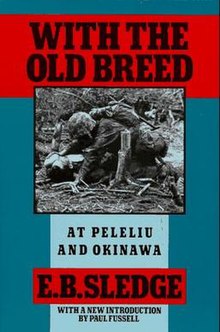With the Old Breed
 Oxford University Cover | |
| Author | Eugene B. Sledge |
|---|---|
| Language | English |
| Genre | War Memoir |
| Publisher | Presidio Press |
Publication date | 1981 |
| Publication place | United States |
| Media type | |
| Pages | 326 p. |
| ISBN | 0-19-506714-2 |
| OCLC | 22653690 |
| 940.54/26 20 | |
| LC Class | D767.99.P4 S55 1991 |
| Followed by | China Marine: An Infantryman's Life after World War II |
With the Old Breed: At Peleliu and Okinawa is a World War II memoir by Eugene Sledge, a United States Marine. Since its first publication in 1981, With the Old Breed has been recognized as one of the best first-hand accounts of combat in the Pacific during World War II. The memoir is based on notes Sledge kept tucked away in a pocket-sized Bible he carried with him during battles.
Origins
By his own account, Sledge began writing the memoir in 1944, "immediately after Peleliu while we were in rest camp on Pavuvu Island", and continued working on it "as soon as I returned to civilian life" in 1946.[1] Nicknamed "Sledgehammer" by his comrades, Sledge experienced combat during the battles of Peleliu and Okinawa as a 60 mm mortarman while part of K Company, 3rd Battalion, 5th Marines, 1st Marine Division (K/3/5).
The book's working title was A Marine Mortarman in World War II, which Sledge later changed to Into The Abyss. The book was first published under its final title by the Presidio Press in 1981.
Synopsis
Sledge's memoir gives a firsthand and unapologetically honest perspective on the Pacific Theater of World War II. His memoir is a front-line account of infantry combat in the Pacific War. It brings the reader into the island hopping, the jungle heat and rain, the filth and malaise, the fear of potential "banzai attacks", and the hopelessness and loss of humanity that so uniquely characterized the campaign in the Pacific. Sledge wrote starkly of the brutality displayed by Japanese (and to a much lesser extent, American) soldiers during the battles, and of the hatred that both sides harbored for each other. In Sledge's words, "This was a brutish, primitive hatred, as characteristic of the horror of war in the Pacific as the palm trees and the islands."
Sledge describes one instance in which he and a comrade came across the mutilated bodies of three Marines, butchered and with severed genitals stuffed into their mouths. He also describes the behavior of some Marines towards dead Japanese, including the removal of gold teeth from Japanese corpses (and, in one case, a severely wounded but still living Japanese soldier), as well as other macabre trophy-taking. He details the process and mechanisms that slowly strip away a soldier's humanity and compassion, making the thought process accessible to those who have never served in combat.
Sledge describes in detail the sheer physical struggle of living in a combat zone and the debilitating effects of constant fear, fatigue, and filth. "Fear and filth went hand-in-hand," he wrote. "It has always puzzled me that this important factor in our daily lives has received so little attention from historians and is often omitted from otherwise excellent personal memoirs by infantrymen." Marines had trouble staying dry, finding time to eat their rations, practicing basic field sanitation (it was impossible to dig latrines or catholes in the coral rock on Peleliu), and simply moving around on the pulverized coral of Peleliu and in the mud of Okinawa.
Printings
- 1981: Novato, California: Presidio Press. — 12197607
- 1983: Paperback: Toronto; New York: Bantam Books. — ISBN 978-0-553-23055-0 — 82912620
- (The Bantam war book series)
- 1990: New York, New York: Oxford University Press. — ISBN 978-0-19-506714-9 — 22653690
- (New introduction by Paul Fussell)
- 1990: Novato, California: Presidio. — ISBN 978-0-89141-119-2 — 21718513
- 1996: Annapolis, Maryland: Naval Institute Press. — ISBN 978-1-55750-747-1 — 35132407
- (Classics of naval literature series; introduction by Joseph H. Alexander)
- 2001: Prince Frederick, Maryland: Recorded Books. — ISBN 978-0-7887-4879-0 — 48064872
- (Audio-10 cassettes)
- 2006: Princeton, New Jersey: Recording for the Blind & Dyslexic. — 70684214
- (Audio-CD)
- 2007: New York, New York: Presidio Press:
- 2010: London, England: Ebury Press
- Trade paperback ISBN 978-0-09-193753-9 - 0091937531
Translation into Japanese
- 2008:講談社-学術文庫 (Kōdansya-gakujutu-bunko, Kōdansya Academic books)
- title ペリリュー・沖縄戦記 (perirū-okinawa-senki, a record of the war at Peleliu and Okinawa)
- size of 文庫本 (bunkobon, poket size paperbook)14.8 x 11 x 2 cm
- ISBN 978-4-06-159885-0
Translation into Thai
- 2010 แปซิฟิก สมรภูมิเดนตาย สหายร่วมรบ by Matichon press
- ISBN 978-974-02-0614-9
Translation into Czech
Se starou gardou: na Peleliu an Okinawě, Universum [translation Michal Ulvr]
- ISBN 978-80-242-2922-5
Adaptations
- 2007: Ken Burns drew considerably from With the Old Breed for his World War II documentary The War.
- 2010: HBO used With the Old Breed, along with Robert Leckie's Helmet for My Pillow, as the basis for the miniseries The Pacific, the successor to Band of Brothers, during which Sledge (played by Joseph Mazzello) is seen occasionally writing notes in his pocket bible.
See also
References
- ^ "With The Old Breed draft foreword". Eugene B. Sledge Papers, RG 96, Auburn University Libraries Special Collections & Archives Department. n.d. Retrieved 2008-11-18.
External links
- Audio interview with E.B. Sledge (6 parts) - Studs Terkel
- Eugene B. Sledge Collection - Auburn University Digital Library
- Victor Davis Hanson's introduction to the 2007 edition of With the Old Breed
- With the Old Breed book review - WW2DB
